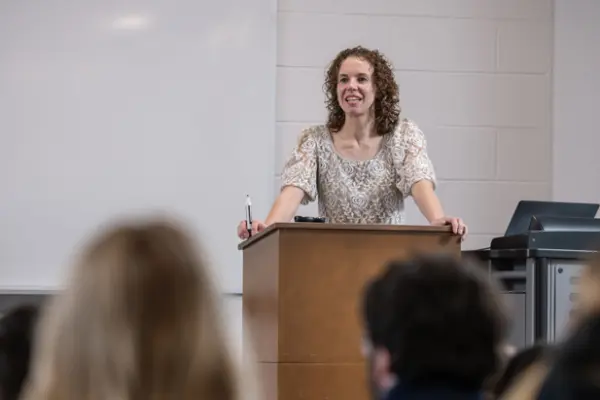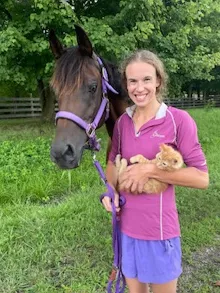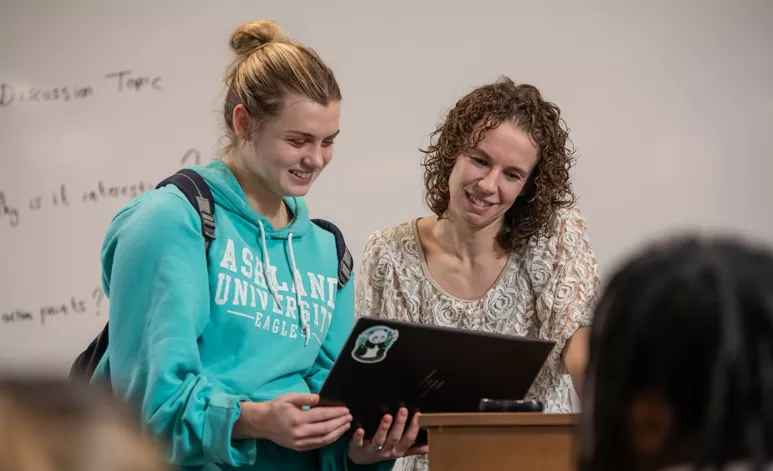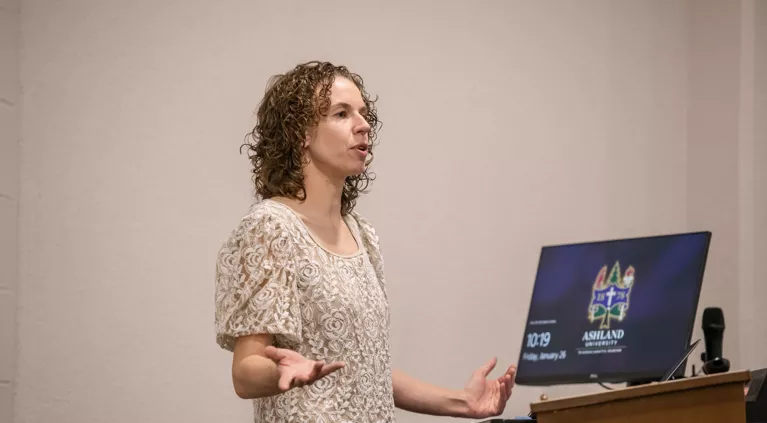
Kirsty Jones happy her career path led her to Ashland University as an assistant professor of religion
Kirsty Jones didn’t start thinking about being a professor of religion until she was working on her doctorate.
“I wanted to do disabilities awareness training in religious communities, teaching about reading Biblical text responsibly, but there aren’t any jobs in that,” said Jones, Ph.D., who joined the Ashland University Religion Department this academic year as an assistant professor.
Jones said she doesn’t have any regrets that her career path led her to being a college instructor, especially at AU.
“This is like a little family,” she said about the university. “Everyone is so incredibly supportive. It feels like people genuinely care.”
Peter Slade, Ph.D., chair of the AU Religion Department, said the department is excited to have her onboard.
“She has already brought a lot of new life to the department,” Slade said. “The students are already wanting to take more of her classes.”
Her enthusiasm and her gift of making everyone feel comfortable in her classes are some of the reasons AU students enjoy her courses so much, Slade added.

As a young girl growing up in England, Jones really wanted to be a veterinarian.
“But I knew that wasn’t going to happen because I’m not scientifically-minded,” said Jones, who loves animals so much that she has a horse, cats, chickens and pet rats – mostly rescue animals.
Most of her writing for her Ph.D. dissertation for Georgetown University was spent in an Ohio field with one of her horses.
“There were no distractions,” she said. “I lived in a friend’s trailer, just me and my animals and I just wrote. I wrote for about nine months. I started in June and submitted it in February.
“I didn’t have a place to live and the dog I had was too old to travel back to England, so a friend let me stay in her trailer,” Jones added.
As a way to include her passion for animals in her teaching, Jones said she redesigned her World Religions classes this semester to include studying religion through animals.
“People like talking about animals, so it’s a safe way to construct arguments about religion that’s not too controversial,” she said.

In addition to two World Religions classes, Jones is teaching an advanced Hebrew Bible class and an Exploring the Bible course online through the university’s Correctional Education program.
She began her AU career last semester teaching two Introduction to the Bible classes and two World Religions classes online for CE students.
“We were wanting someone who could teach World Religions and the Bible, and she brings both,” said Slade, who also is from England. “That’s an unusual combination of skills.”
As an added bonus, Jones also brings a lot of knowledge in disabilities studies in religion and in the Bible. That was her primary research topic for her undergraduate thesis at Cambridge University in the United Kingdom, where she also earned her master’s degree. She has had several articles on the subject published and plans to write a book based on her undergrad thesis.
“I did a lot of practical work with people with disabilities and realized that religious spaces weren’t necessarily too accommodating for the people who I worked with,” Jones said. “I realized that the people who were leading congregations were preaching and teaching the Biblical text in a way that was representing broader, ablest culture.
“I was going to try to help people read Biblical text about disabilities in a different way,” she continued. Then shaking her head in disbelief added: “That’s a lofty goal as an undergrad.”
That interest in people with disabilities came as a teen through a work experience. The UK requires students in ninth grade to do a work experience to try to figure out what kind of job they want to do when they grow up, Jones said.
Knowing a veterinary experience wasn’t a practical option for her, Jones decided to work at a school for disabled students at her mother’s suggestion. Jones said she loved it and even grew close to one of the students there, as well as his sister, and is still in contact with them.
“I wanted to be a special ed teacher, but in the UK it makes sense to get a degree in a subject and then do your teacher training,” Jones said. “The subject I was most interested in was religion, so I figured I would get a degree in religion, and then do my special ed training.
“I never got beyond studying religion,” added Jones, who believed she could help bring more changes for people with disabilities doing broader awareness training in education than in a classroom with disabled students.

As much as she can, Jones said she tries to integrate studies of disabilities in the Bible in her classes and hopes to teach a seminar course on the topic at some point.
“Something that I do that is an easy way to break it in is students are familiar with the miracle stories with Jesus, so I ask them provocative questions like: ‘Jesus cures someone who didn’t ask to be healed, is that using power responsibly or is that what society wants?’ ” Jones said.
Because she’s enjoying it so much, Jones said she doesn’t plan to change the career path she has found herself on as a religion professor, which included short stints as an adjunct at the University of Dayton, George Mason and United Theological Seminary in Dayton while working toward her doctorate at Georgetown. On the day she graduated from Georgetown, Jones said she received the job offer from Ashland.
“Landing this job felt like a miracle because it’s so hard to get a higher education job,” Jones said. “A couple of my friends in the same career sphere haven’t gotten jobs, and to be in a place where your colleagues care about your well-being beyond your performances is really, really nice.”
